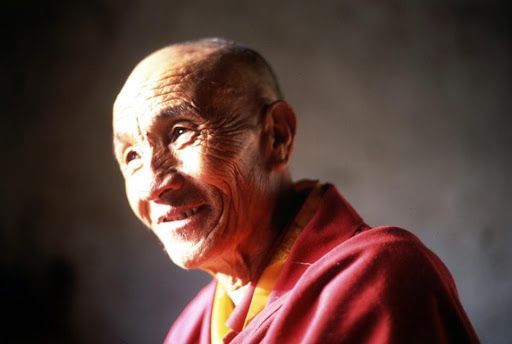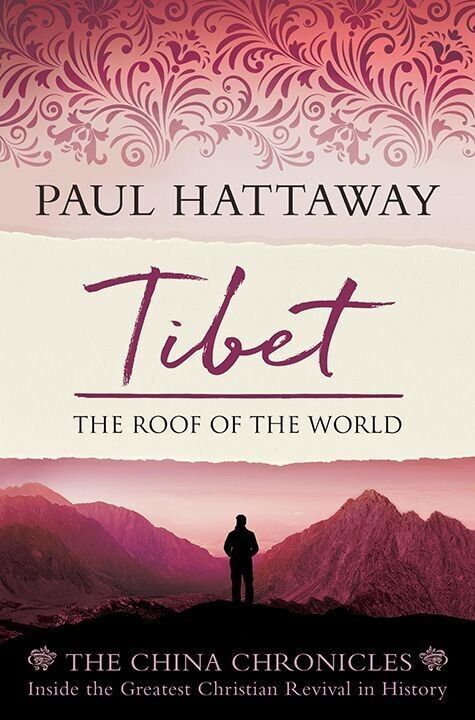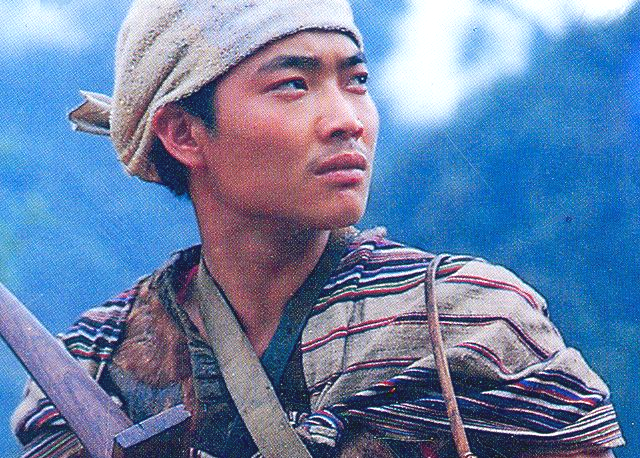Nyima Chothar
A Tibetan Monk's Story
I am a Tibetan and this is my story.
West of Lhasa is the province of Tsang—home to the city of Xigaze and the famous Tashilhunpo Monastery, which was founded by the First Dalai Lama, Gedyn Druba (1391–1472). It is the seat of the Panchen lamas, and the bodies of all the Panchen lamas are buried there.
I was born into a family of farmers in the fire-serpent year (1917), in the little village of Chum in Namling County. When I was small, I used to play at being a monk: beating the drums, blowing the white conch shell, setting up the special offerings called tormas and imitating the sacred dances. My parents encouraged me by giving me red and yellow clothing, just like the monks.
Before I was seven, wanted me to enter the monastery, as it is considered a great honor to a Tibetan family when a son becomes a monk. My uncle enrolled me as a novice monk, even though, according to the monastery rules, I should have been seven. Since I was still only six, my uncle told me: "You must say that you are seven. If you don't, you can't stay in the monastery."
The two of us then went to meet the abbot. He asked me: "Are you younger than seven years-old?"
I replied, "I am just six, but my uncle told me to say that I was seven."
The abbot looked at my red-faced uncle and laughed, and then told me, "Since you have spoken truthfully to me, you are worthy to be a monk. In the future you will grow up to be an honest man." Then the abbot gave me my new name—Nyima Chothar.
At the time I had no idea what the monks did. I just knew they wore nice clothes and ate good food. Because I was still so young, for a year I did no study, but just played. Our monastery was on a hill, and the monks had to carry me on their shoulders as they went up and down the stairs.
From the time I was 8 until I was 11, I studied the Tibetan language and I also took an examination on the Gyan Juk (a Buddhist philosophy book). Out of the 60 boys who took the exam, I had the good fortune to receive the first prize—a khata, or Tibetan ceremonial scarf.
Although I studied hard, I was often disobedient, and my uncle and teacher punished me many times. Some of us would run away from the monastery, but our parents would catch us and take us back. Two of my friends and I fled to the top of a high mountain and stayed there for some time. When our food ran out, we ate birds' eggs. When we finally came down from the mountain our parents caught us and returned us to the monastery, where we were severely whipped.
Later, I asked my parents for permission to go to Lhasa, and I prepared clothes and food for the nine-day journey by horse and mule. When I reached Lhasa I stayed in Sera Monastery's Je College, where about 30 monks were studying Buddhist philosophy. For two years I stayed there, diligently studying the Buddhist scriptures and commentaries.
During the Tibetan New Year holiday, when monastery rules were more relaxed, the monks gambled with dice and were allowed to play various games. The other monks were much smarter than me, and I gambled away all my money and possessions.
From the Potala Palace to Bhutan
One day my teacher came to me and asked: "The Dalai Lama's bodyguard at the Potala needs a servant. Will you go?" I stayed about a year with the bodyguards. Most people found it almost impossible to meet the Dalai Lama, but I saw him every day. At that time I was 13 years-old.
The monks at Tashilhunpo liked to go to the park and gamble, and my friends and I used to go with them. If the Pon Po (monk in charge of discipline) came along, we would all run away. If we couldn't get away and he caught us, he would whip us many times. Tired of the punishments, three of us fled from the monastery to the country of Bhutan, where I remained more than a year.
The Bhutanese people received us warmly. Wherever we went they offered us food and free places to stay. Even families living far away would invite us to stay in their homes. A few families even asked us to serve as their personal lamas.
In February 1950, one of my fellow monks decided to live with a Bhutanese woman. I thought to myself, "I would never do that," but one evening all of us got drunk and we broke our monastic vows with women. I felt deep regret, knowing I had brought shame on my parents, and I didn't want to stay there anymore.
A Strange new Teaching
In January 1951 I moved to Phari, near the border between Tibet and Bhutan. I got a job carrying loads of wool across the Himalayas from Phari to Kalimpong, and hauling kerosene back the other direction. After a year, the man I was working for went out of business, and I moved to Calcutta to work as a cook. It was so hot there that I lost my strength. I contracted malaria and was unable to work.
I intended to return to Tibet by way of Bhutan, so I put on monk's clothes and went out to recite the Buddhist scriptures in return for alms. My condition worsened, however, and I became very sick.
There was a Christian hospital in the town of Baxaduars, run by a Finnish mission. A lady named Hellin Hukka gave me good treatment, and after a month I regained my strength. Miss Hukka exchanged the Buddhist books from which I'd been reading for a big book called a Bible. I was still going out and reciting scriptures in people's homes to earn some money, but Miss Hukka encouraged me not to go, and offered me a job teaching her Tibetan for an hour each afternoon, and she taught me English.
While I stayed with the Christians at the mission hospital, every morning and evening I attended their little worship service.
I opened the Bible, and read about a God who created the sky, the earth, the ocean, the trees, and all that is in the world. The Bible said that God made the first man and woman, but they disobeyed His command. Their sin spread to all humankind, making us all sinners.
This new teaching was strange to me. According to our Buddhist religion, the world arose by itself. A monkey, the emanation of the god Chenrezig, was the father of all people; and a rock demoness was the mother of all. That was the way the human race began.
I had to decide about which story was true. I was shocked when I read in the Bible that idols are worthless, and that making sacrifices to them is pointless. I thought, "If this is true, then all the religion I've practiced so far is worthless. This Christian religion is unsuitable for Tibetans," and I stopped reading the Bible.
One day a Bhutanese girl named Sangey came to the hospital with a foot infection. Her sore smelled awful, but nevertheless I washed it and applied medicine, and after a month it was healed. Sangey and I liked each other and we decided to live together, but Miss Hukka discovered our plans and sent Sangey to Darjeeling. I was upset and immediately traveled to Darjeeling, convinced that Christians were nasty people who liked to interfere in other people's business.
The Teaching follows Me
While I was on my way to Darjeeling, Miss Hukka phoned ahead and called Sangey back to Baxaduars. When I discovered she was gone, I was broken-hearted. I visited the local market, where I met a tall Englishman named Ernest Shingler, who offered me a job.
He arranged a small room for me to stay in, and every afternoon I taught him and his wife Tibetan. One day he asked me if I'd heard about the Jesus religion. I told him I had, and he gave me another Bible, just like the one I'd left behind in the mission hospital.
It felt as though I couldn't escape hearing about Jesus! I thought maybe it was my fate, so I began to read the Bible and pray. Although I thought I was a Christian, and others said I'd become one, I was really just going through the motions and my heart had not changed.
Because I'd studied Buddhism for so many years, I couldn't leave it. Occasionally I still said mantras and recited texts, and I still believed in the Buddhist gods and idols. The Christians I met were very devout, but I wondered why they made no offerings to their God.
One day, as I was reading the book of Isaiah, I came across these words, which shook my faith in the Buddhist gods:
"All who make idols are nothing, and the things they treasure are worthless.
Those who would speak up for them are blind; they are ignorant, to their own shame. Who shapes a god and casts an idol, which can profit nothing? People who do that will be put to shame; such craftsmen are only human beings. Let them all come together and take their stand; they will be brought down to terror and shame.... Such a person feeds on ashes; a deluded heart misleads him; he cannot save himself" (Isaiah 44:9-11, 20).
Mr. Shingler kept coming for his Tibetan lessons three times a week, and each time I prayed with him I felt much better. God deepened my understanding and brought about many changes to my way of thinking. I stopped wandering about at night and quit many of my former bad habits.
A short time later I fell ill with a fever, and a Pentecostal preacher from South India came to the hospital. Through his prayers a number of the patients were healed, and he asked me if I believed in Jesus.
"Yes, I believe in Jesus," I replied, and the evangelist was glad. He then asked, "Do you believe that if you pray to Jesus your illness will be healed?" "I do," I replied. He placed his hands on me and prayed in a loud voice, much to the amazement of the other patients who were looking on. Some of the other patients were healed by the power of his prayer.
The following day I felt the fever had left my body and I had peace in my mind. I believed in Jesus and had been healed.
God gives me a New Heart
When I returned home and Mr. Shingler and his wife saw me, they asked how I had been released from the hospital so quickly. I told them the whole story, and they were very happy and praised God. Later that evening I read in the Bible: "You were taught, with regard to your former way of life, to put off your old self, which is being corrupted by its deceitful desires; to be made new in the attitude of your minds; and to put on the new self, created to be like God in true righteousness and holiness" (Ephesians 4:22-24).
I was deeply touched by the beauty of these words, and I received a new heart. I turned away from adultery, drinking and other sins. I confessed them to God and He washed them away by the blood of the Lord Jesus. Now I was a real Christian!
Because I had studied Buddhism for so long, it had taken me three years to come to faith in Christ. In November 1955 I was baptized at the Finnish Mission in Darjeeling. Because it was cold, the church members poured a great deal of hot water into the baptismal pool, but the air was so cold that it had little effect. Everyone was excited because I was the first Tibetan ever to be baptized there.
After my baptism many people asked what kind of work I was going to do. "I don't know," I replied, "I'll do whatever God tells me."
Soon after, I got a job in a restaurant, where I met a young Tibetan woman from Lhasa named Rigdzin Wangmo. We liked each other and, after arranging matters with our friends, we were married in the restaurant.
A few months later, Rigdzin and I left for Calcutta. While we were there, in February 1957, both the Dalai Lama and the Panchen Lama visited the city, and we met with them at the Grand Hotel. The Dalai Lama asked us about our future plans, and many other questions.
"We plan to return to Tibet," I told him. But he said: "If you go back to Tibet it won't do any good. Keep on doing the very thing you're doing now. Don't steal or fight; live peaceably with others; be diligent; and you'll be happy."
My Wife believes in Jesus
After Mr. Shingler and others shared the gospel with Rigdzin, she repented and believed in the Lord Jesus. She was baptized in 1957, and we had a second wedding ceremony in church, now that both of us were Christians.
In 1959 the Chinese invaded Tibet and large numbers of Tibetans fled to India. Many church people helped the refugees, and because we were Tibetan Christians, they invited us to join them. We gave out Christian books, and whenever we saw monks we would talk to them about Christ.
This is my story of how God saved a Tibetan monk and made him His child.
The Lord has been good to us all these years. In February 1960 God gave us a son, whom we named Yacob. For many years my family continued to serve the Living God among Tibetans throughout the Himalayas. We taught in schools, treated the sick, preached the gospel, and started a home for Tibetan refugees.
The Lord Jesus graciously intervened on my life journey and set me on a new path to heaven. Please pray for my fellow Tibetans, that they too would have their eyes opened to see that Jesus Christ is the one true Savior that they inwardly long for.
© This article is an extract from Paul Hattaway's book ‘Tibet: The Roof of the World’. You can order this or any of The China Chronicles books and e-books from our online bookstore.






